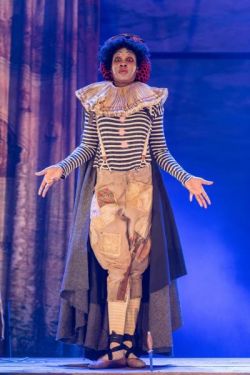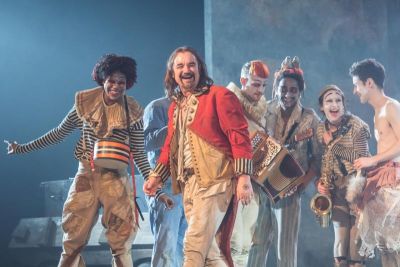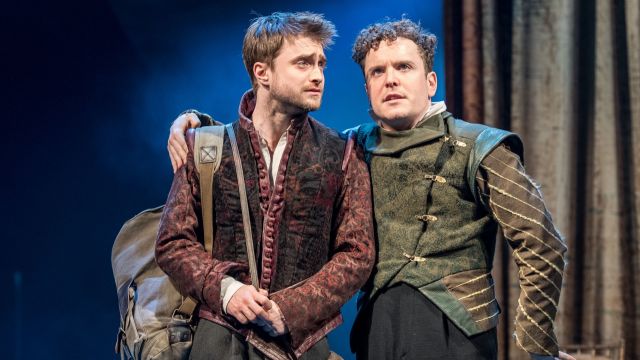Rosencrantz & Guildenstern Are Dead
Do we ever quite know who Rosencrantz and Guildenstern are? Or like King Claudius and Queen Gertrude in Hamlet, are we ever quite sure which is which? Why them? These are questions that plague Rosencrantz and Guildenstern themselves (along with questions of chance, luck and fate, what is real and what is not) and provide the material for much (endless?) debate between them. Where do they come from? What were they doing before Claudius, the new king of Denmark, summoned them? Are they really old mates of Hamlet? And where will they go when whatever it is required of them is done?
The two are not, however, interchangeable, and the performances of Joshua McGuire, as Guildenstern, and Daniel Radcliffe, as Rosencrantz, point this up. Guildenstern is the constantly agitated, constantly speculating motor-mouth, while Rosencrantz, equally unsure, with his shit-eating grin, is more reactive and not so smart. Curiously, while Mr McGuire is the better ‘actor’, Mr Radcliffe comes across as the more sympathetic, more human. (Perhaps it’s his years – and years – as Harry Potter.)

Tom Stoppard’s famous, 50-year-old play takes off from what little – very little – Shakespeare tells us about these two chancers which is not much more than that they used to be close friends of Hamlet. “…being of so young days brought up with him, And since so neighboured to his youth and humour…you may glean, Whe’r aught to us unknown afflicts him thus…” Yet when they meet Hamlet on stage, some ribald repartee soon gives way to stand-offish suspicion and we see – and Hamlet sees – that the two of them are hired spies and not up to the task Claudius sets them. Hamlet himself (Luke Mullins) is tall, classically good looking, cold and condescending to his ‘friends’ – a completely unsympathetic performance. His ‘friends’, ever wanting certainty, won’t get it from him.
Rosencrantz and Guildenstern are, in fact, not up to any task that is set them. It’s interesting too that the two actors are, with due respect, rather short and everyone else – Hamlet, Claudius (Wil Johnson), the Players, even Gertrude (Marianne Oldham) - towers over them. Director David Leveaux has clearly cast with more than performance in mind. Constantly paralysed by uncertainty, existential doubt and a tendency to overthink, Rosencrantz and Guildenstern dither, pathetically grateful for any direction or advice from anyone who appears, unlike them, to know which way is up.
Therefore, it’s not surprising that the play, or at least this production, is dominated by the Player King (David Haig) in the costume of, perhaps, a cashiered military man. This huge, gloriously over-the-top performance is a wonder. In contrast to our hapless duo, the Player King is a realist who, although it is his profession to pretend, is absolutely, bombastically certain about everything. His troupe of actors, six motley clowns (Louisa Beadel, Josie Dunn, Matthew Durkan, Evlyne Oyedokun, Alex Sawyer and Tim van Eyken), never speak, but are all musicians, weaving sound and movement through the main action and yet ever so attentive to it. Their production of the play, “The Murder of Gonzago”, which Hamlet requests, here plays out to its end after, as in Hamlet, the performance is interrupted by Claudius’ rattled departure. Rosencrantz and Guildenstern watch on but, of course, in the wrong spirit and they miss the point. Rosencrantz is, as usual, uncertain, while Guildenstern pretends he’s not by posing as some sharp, objective theatre critic. Neither one sees that the players are enacting their fate. Well, it’s only a play. The irony and the way it is delivered is delicious.

Anna Fleischle’s design is stripped back, but employs the full depth of the Old Vic stage, even extending the apron, thus diminishing the two little eponymous figures further, and surrounding them with a vast sky of drifting clouds. Changes of scene are indicated by the movement of a single curtain. Howard Harrison’s lighting isolates characters in pools of light – or loses them in gloom. Everything is skilfully directed to the central theme: uncertainty.
Here we have the 50th anniversary production of Stoppard’s play. How does it stand up? The production is impressive, reconceived with great imagination and a coherent attention to detail in all respects and the performances are wonderful. There are sequences of sublime humour – for instance, the ‘tennis match’. The play survives, let’s say, because of the witty spin-off from Hamlet, and the way that Rosencrantz and Guildenstern (like Vladimir and Estragon, whom they frequently resemble) are, as it were, Everyman – i.e. us – uncertain but longing for certainty, victims of what could be fate or could be our own blinkered mistakes. But Mr Stoppard wrote the play when he was twenty-nine or thirty and its verbal fireworks, constant paradoxes and reversals for their own sake (or so it can seem) can get just a trifle wearing, and the play perhaps lacks the substance and humanity of his later works. Nevertheless, this is an inventive and dazzling theatrical production. By making much of the Player King and the Players, who are ‘acting’ to survive, the central, crucial irony of the piece is unmistakeable.
Michael Brindley
Photographer: Manuel Harlan.
Subscribe to our E-Newsletter, buy our latest print edition or find a Performing Arts book at Book Nook.

